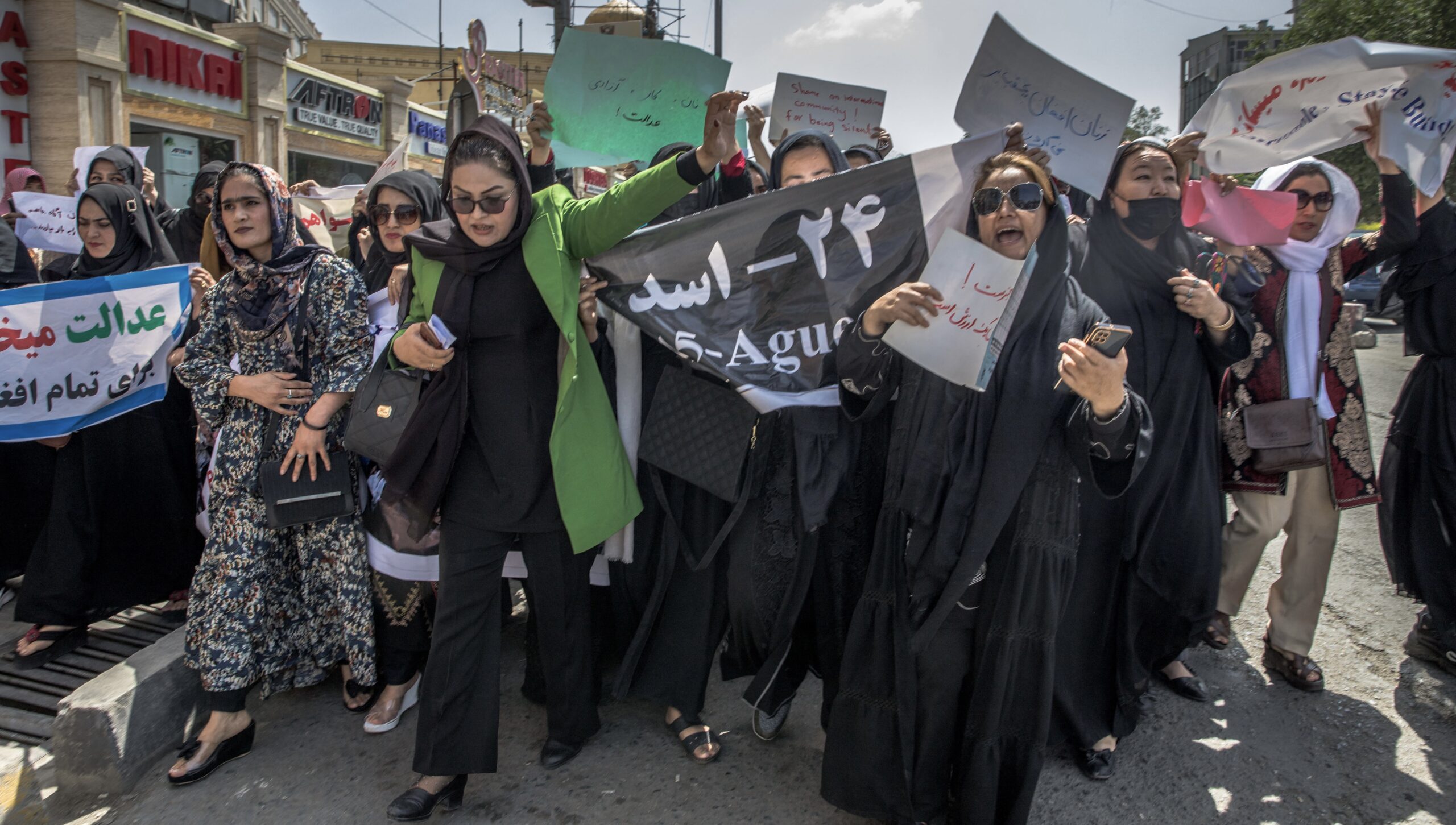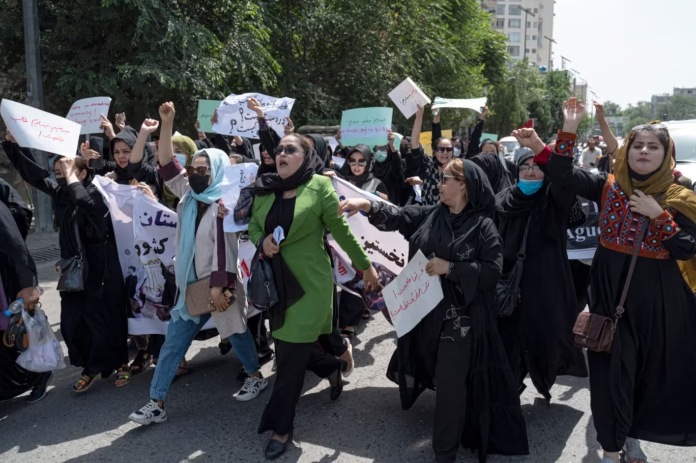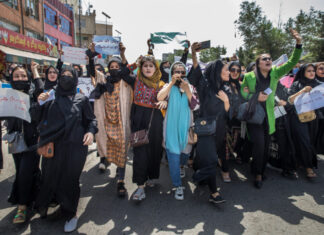On August 15, 2021, Kabul fell to the Taliban. Zholia Parsi, who was in Kabul at the time, had spent fourteen years as a teacher before joining the last republican government of Afghanistan as a member of the Supreme Council for Reconciliation. After the Taliban took over, Parsi helped create the “Spontaneous Women’s Protest Movement of Afghanistan” to demonstrate against rising gender apartheid in her country. For this, the Taliban imprisoned and tortured her, a story she recounts below.
I was held in solitary confinement in a damp room for nearly two months and routinely interrogated and tortured for a confession.
I was born in Karaj, Tehran, and after many years in Iran, I returned to Afghanistan to work. At that time, Afghan women were beginning to engage with democracy and reclaim their place in public life, but the Taliban attacked this progress with a relentless assault on civilian life. The group destroyed infrastructure; attacked schools, universities, and hospitals; and ultimately seized control of the country before imprisoning women in their homes.
Days before the Taliban entered Kabul, Kandahar had fallen. My mother and siblings fled to my home in Kabul, leaving everything behind as our father’s house in Kandahar was surrounded by Taliban forces, who arrested the men in our family.
On August 15, 2021, I saw Taliban fighters in the streets as I attempted to reach my office. They were on motorcycles and in military vehicles, brandishing white Taliban flags, their faces weary yet triumphant. People were fleeing in terror. Unable to reach my destination, I turned back, a journey that stretched for hours due to the chaos. In the sixth district, Taliban soldiers angrily lowered Afghanistan’s tricolor flag, replacing it with their own.
The sight of people’s panic and the violent, angry faces of the Taliban terrified me. I began to fear that they would notice my uncovered face. At one point, a Taliban soldier slammed the car I was in and demanded to know, “Who is this, and where are you taking her?” The driver, thinking quickly, responded, “She is my daughter, and I’m taking her home.” Later, near the American University, the sounds of gunfire filled the air, and I broke down in tears.
My husband and I were on an evacuation list, but when we attempted to reach the airport with a single bag of clothes, we turned back in fear after witnessing a deadly explosion there. On the way home, I saw the Taliban whipping a woman over her clothing. Her husband pleaded for leniency, but they insulted him too, accusing him of dishonor for allowing his “bad wife” to go out in public. This is how gender apartheid operates under the Taliban—not only imposing strict regulations on women but also systematically turning men in the family into enforcers of the Taliban’s control over women.

Taliban members responded to our growing protests with ever more suppression and violence. They knocked us to the ground, punched and kicked us, and destroyed our phones and property. Many of us were detained for days and subjected to threats and insults. Some were imprisoned and tortured for longer. Until I was kidnapped and imprisoned by the Taliban, I participated in thirty-eight protests against its oppressive apartheid regime.
Over time, Taliban intelligence infiltrated our organization, and the regime knew about our protests before they even took place. On September 19, 2023, I received a call alerting me that the Taliban had kidnapped a fellow organizer along with her husband and child, and warning me that I could be next. I fled my home that day, leaving my daughters with my mother for their safety. But when I secretly returned a week later to attend a funeral, I was accosted on my street by a man who shouted, “It’s her.” Within minutes, twelve Taliban military vehicles arrived. The men put a black hood over my head, forced me into a car, and took me to a police station with my hands tightly and painfully bound for hours.
On arrival, they pointed a gun at me and demanded the password for my mobile phone. I resisted at first but relented when they threatened to torture and arrest my children. They threw me into a room where I sat, worried for my fellow female protesters who were unaware that my phone was now in Taliban hands. Half an hour later, the person who arrested me entered the room with my son’s and daughter’s phones. When I saw my nineteen-year-old son’s unlocked phone, I realized that he too had been arrested and I collapsed to the ground.
I was held in solitary confinement in a damp room for nearly two months and routinely interrogated and tortured for a confession. They would show me videos of my son, wearing a prison uniform and growing weaker by the day. I later learned that he was also being held in solitary confinement. Twice during my imprisonment I was hospitalized, once due to severe pain and swelling, the other because I broke down after witnessing the suicide of a young boy who took his life after being tortured.
Still, I was lucky compared to other prisoners, who were subjected to whipping, electric shocks, and forced starvation. They didn’t torture me in these ways. Instead, they inflicted psychological torture, placing my room across from the men’s torture chamber where I lay awake listening to their screams for days. During my interrogation sessions, I was forced to sit upside down with my hands tied to the arms of the chair. At one session, I overheard the Taliban interrogators say, “If she is released, she will talk about this. After all, she is the leader of these movements.” I realized then that they were afraid of my voice, just as all apartheid regimes fear the voices of their citizens.
On the forty-fifth day, I was allowed to see my family for five minutes. They told me they had been searching for me and submitted endless petitions to the Taliban before the regime finally confirmed my detention. This was the first time I was allowed to see my imprisoned son, though only for five minutes.
About eighteen days later, I was returned to the general cells, where other women prisoners recounted their stories and those of other friends, including one who repeatedly tried to escape and fought fiercely every time Taliban soldiers took her for interrogation. She was eventually released after nine months.
I too was desperate for release and to see my family, but I never showed my despair to the prison guards. Even when they punched and kicked me—or worse, when they called my son “de caper zoi” (son of the infidel), I kept my composure. No one was willing to bail me out of prison because they feared becoming targets as well. Eventually, however, a former Taliban governor agreed to be my guarantor, and I was released into my family’s custody.
Although free, I was confined to my house, the streets of my city closed off to me. Taliban fighters kept a constant watch on me and my home. They also offered me a proposition: Spy for them, and I could live comfortably wherever I wanted in Afghanistan. Betraying my homeland and the freedom of its women was never an option for me.
Ultimately, I was forced to accept exile. Late one evening, I received an email notifying me of my transfer outside the country. I cried through the night, mourning the loss of my home and homeland. When I crossed the border out of Afghanistan, I screamed in anguish. I considered staying behind and secretly working under an assumed identity, but it was not a viable choice for my family.
I am now a stranger in a foreign land, without a home and without an identity. I count the minutes until I can return to Afghanistan and witness the fall of the Taliban. In exile, my greatest hope is that our protests, our sacrifices, our rebellions were not in vain.
This article was edited from an interview with Parsi by Nayera Kohistani and Mursal Sayas.
This article is part of the Inside the Taliban’s Gender Apartheid series, a joint project of the Civic Engagement Project and the Atlantic Council’s South Asia Center.
Zholia Parsi is a member of the leadership of the “Spontaneous Women’s Protest Movement of Afghanistan” and was imprisoned and tortured by the Taliban for protesting against gender apartheid.










